| |||||
| Decades: | |||||
|---|---|---|---|---|---|
| See also: | |||||
Events in the year 1915 in Bulgaria .
| |||||
| Decades: | |||||
|---|---|---|---|---|---|
| See also: | |||||
Events in the year 1915 in Bulgaria .
| | This section needs expansion. You can help by adding to it. (August 2020) |

Bulgaria, officially the Republic of Bulgaria, is a country in Southeast Europe. Located west of the Black Sea and south of the Danube river, Bulgaria is bordered by Romania to the north, Serbia and North Macedonia to the west, Greece and Turkey to the south. Bulgaria covers a territory of 110,994 square kilometres (42,855 sq mi), and is the sixteenth-largest country in Europe. Sofia is the nation's capital and largest city; other major cities are Plovdiv, Varna and Burgas.
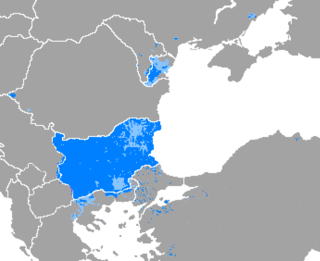
Bulgarian is an Eastern South Slavic language spoken in Southeast Europe, primarily in Bulgaria. It is the language of the Bulgarians.
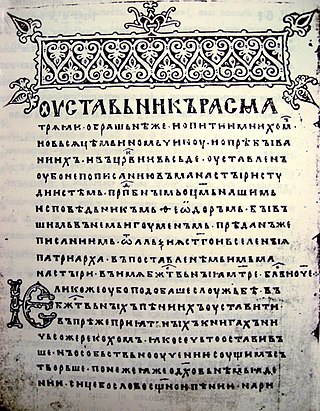
Old Church Slavonic or Old Slavonic was the first Slavic literary language.
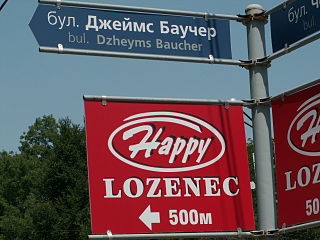
Romanization of Bulgarian is the practice of transliteration of text in Bulgarian from its conventional Cyrillic orthography into the Latin alphabet. Romanization can be used for various purposes, such as rendering of proper names and place names in foreign-language contexts, or for informal writing of Bulgarian in environments where Cyrillic is not easily available. Official use of romanization by Bulgarian authorities is found, for instance, in identity documents and in road signage. Several different standards of transliteration exist, one of which was chosen and made mandatory for common use by the Bulgarian authorities in a law of 2009.

The Battle of Kirk Kilisse or Battle of Kirklareli or Battle of Lozengrad was part of the First Balkan War between the armies of Bulgaria and the Ottoman Empire. It took place on 24 October 1912, when the Bulgarian army defeated an Ottoman army in Eastern Thrace and occupied Kırklareli.

The First Bulgarian Empire was a medieval state that existed in Southeastern Europe between the 7th and 11th centuries AD. It was founded in 680–681 after part of the Bulgars, led by Asparuh, moved south to the northeastern Balkans. There they secured Byzantine recognition of their right to settle south of the Danube by defeating – possibly with the help of local South Slavic tribes – the Byzantine army led by Constantine IV. During the 9th and 10th century, Bulgaria at the height of its power spread from the Danube Bend to the Black Sea and from the Dnieper River to the Adriatic Sea and became an important power in the region competing with the Byzantine Empire. It became the foremost cultural and spiritual centre of south Slavic Europe throughout most of the Middle Ages.
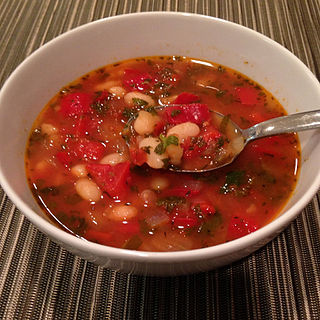
Bob chorba is a chorba, a Bulgarian soup. It is made from dry beans, onions, tomatoes, chubritza or dzhodzhen (spearmint) and carrots.

The National Social Movement was a minor Bulgarian political party formed in 1932 by Aleksandar Tsankov.

The National Socialist Bulgarian Workers Party was a Nazi party based in the Kingdom of Bulgaria.
Čalgija or Chalgiya is a Macedonian and Bulgarian music genre, which also is a subgenre of the old urban traditional folk music of Macedonia and Bulgaria.
Serbomans is a Bulgarian pejorative term used by Bulgarian nationalists for inhabitants in the region of Macedonia that claimed Serbian ethnicity and supported Serbian national ideals until the middle of the 20th century. They explained it as being imposed by Serbian propaganda promulgating a secondary identity, which resulted in a Bulgarian population that had lost its real nationality. It is also still used pejoratively by Bulgarians to refer to residents of North Macedonia who proclaimed a separate Macedonian identity and act to subdue Bulgarian nationalism in Macedonia. The term first appeared during the time of the Serbian-Bulgarian rivalry for present-day North Macedonia during the second half of the 19th century.

Capital punishment in Bulgaria was abolished on December 12, 1998 with the last execution, that of attempted saboteur Georgi Alinski, having been carried out on November 4, 1989. The Parliament of Bulgaria had introduced a moratorium on July 7, 1990 and protocol number six of the European Convention on Human Rights came into force on October 1, 1999.
Paramun is a village in Tran Municipality, Pernik Province. It is located in western Bulgaria, 66 km from the capital city of Sofia and 14 km from the town of Tran, near the Serbian border. The toponym is of Byzantine Greek origin, from the loanword paramun meaning "guard, watch, sentry". It was rendered as παραμονή in Greek and was retained in medieval Serbian as ПАРАМОУНЬ. The name was first mentioned in 1451 and 1453.
Bulgarophiles is a term used for Slavic people from the regions of Macedonia and Pomoravlje who are ethnic Bulgarians. In Bulgaria, the term Bulgaromans; refers to non-Slavic people such as Aromanians with a Bulgarian self-awareness. In the 20th century, Bulgarophiles in neighboring Yugoslavia and Greece were considered enemies of the state harboring irredentist tendencies.

Marin Petrov Goleminov was a Bulgarian composer, violinist, conductor and pedagogue.

Bulgaria liberated itself from the Ottoman Empire in 1878 and, although it remained de jure autonomous until the proclamation of full independence in 1908, it acted as a de facto independent country. From 1879, stamps were issued in Bulgarian Cyrillic script and some of the stamps—such as those issued in 1901—commemorated the 25th anniversary of the April Uprising against the Turks and, in 1902, celebrated the 25th anniversary of the Battle of Shipka. Bulgaria become a de jure independent state in 1908, even though early stamps issued in the 1910s still depicted Tsar Ferdinand and Tsar Boris III.
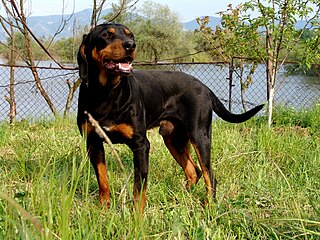
The Bulgarian Scenthound is a dog breed from Bulgaria. It originated in the Ludogorie region of northern Bulgaria, and is the most widely distributed smooth-haired hunting dog in Bulgaria. It is a non-standardised breed but conforms to hound body morphology.

Talev Glacier is the 4 km long and 2.8 km wide glacier on Barison Peninsula, Graham Coast on the west side of Antarctic Peninsula, situated west of Cadman Glacier and southeast of Butamya Glacier. It drains northeastwards, and flows into Beascochea Bay.
Briula or Brioula was an ancient city and bishopric of ancient Lydia or of Caria in Asia Minor, which remains a Latin Catholic titular see.
Events in the year 1924 in Bulgaria.